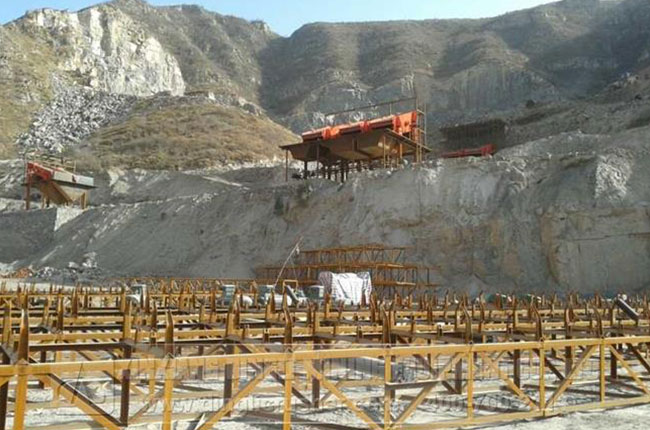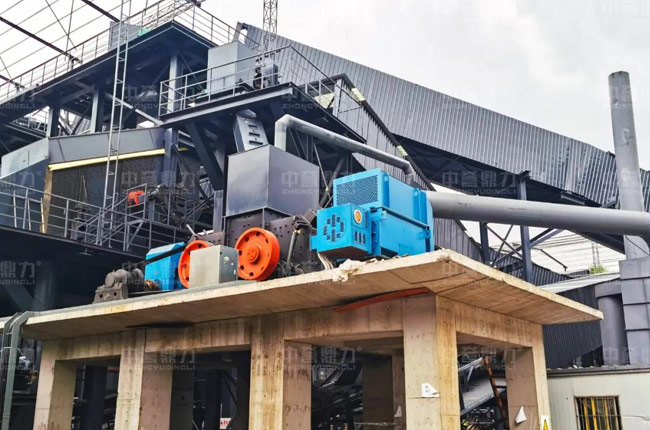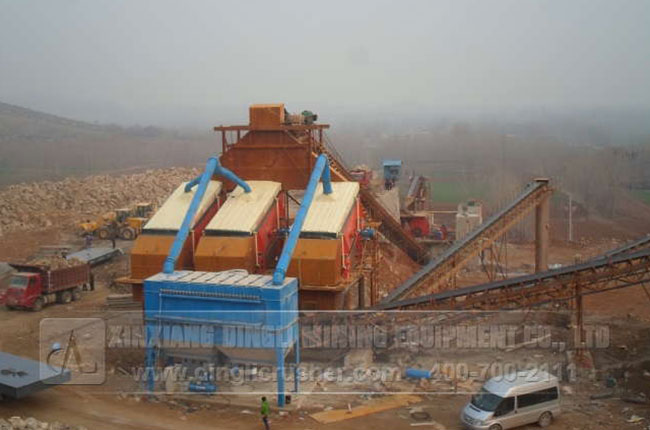 Sand Aggregate IndustryComprehensive Service Provider
Sand Aggregate IndustryComprehensive Service Provider Sand Aggregate IndustryComprehensive Service Provider
Sand Aggregate IndustryComprehensive Service Provider| Specification | Details |
| Crusher type | Cone crusher, hydraulically adjusted |
| Application | Minerals processing |
| Crushing stage | Tertiary, quartenary, pebble |
| Max. feed size, F100 | 123 mm |
| CSS range | 10-44 mm |
| Nominal capacity* | 155–517 mtph |
| Weight | 38,930 kg |
| Total weight (incl. subframe and drive) | 49,750kg |
| Ambient temperature | -20°C to +40°C |
EC = Extra coarse
C = Coarse
M = Medium
F = Fine
EF = Extra Fine
CH865i PERFORMANCE – NOMINAL CAPACITY* (MTPH)
| Concave | MF | F | EF | |
| Max. feed size (mm) | F90 | 86 | 68 | 51 |
| F100 | 108(123**) | 85(97**) | 63(72**) | |
| Max. motor power (kW) | 500 | 500 | 500 | |
| Eccentric throw (mm) | 30-70 | 30-70 | 30-70 | |
| CSS (mm) | 10 | - | 183 | 155-285 |
| 13 | 215-322 | 199-365 | 169-309 | |
| 16 | 231-424 | 215-394 | 182-333 | |
| 19 | 248-455 | 231-423 | 195-358 | |
| 22 | 265-486 | 246-452 | 208-382 | |
| 25 | 282-517 | 262-480 | 222-407 | |
| 29 | 305-508 | 283-472 | 240-399 | |
| 32 | 322-509 | 299-473 | 253-400 | |
| 38 | 356-474 | 330-440 | 279-373 | |
| 44 | 389-422 | 362-392 | 306-332 | |
| Mantle | EF/OB | EF/OB | EF/OB |
*Note: The processing capacity of the CH865i cone crusher may vary with different materials and feeding sizes.

At the production site it is seen the overall stone production can be completed with only a set of crusher.

Tiancheng Mining and Zhongyu cooperation, the new production of 1500 tons of environmental protection intelligent aggregate production line, production line by Zhongyu design, provide and install a complete set of mining equipment and intelligent management system

The aggregates production line of Huaibei totally meets Anhui actual situation of huge limestone resources. The heavy hammer crusher is adopted to take place traditional jaw crusher and impact crusher.
The production efficiency of the CH865i cone crusher is influenced by a multitude of factors.
Regarding crusher performance, the swing speed of the moving cone is of utmost importance. An appropriate swing speed can augment the number of impacts on the material, resulting in a more uniform particle size. However, if the speed is either too high or too low, the productivity will decline. The advance angle determines the eccentricity and the stroke of the discharge port. Provided the overall performance of the machine permits, a larger advance angle can enhance the crusher's productivity. Nevertheless, an excessively large advance angle will deteriorate the dynamic performance of the entire machine.
The structure of the crusher also has a significant impact on production efficiency. In terms of the length of the parallel zone, shortening it can increase the output but compromise the product quality. Conversely, increasing its length has the opposite effect. Enlarging the size of the closed side discharge port will boost the crusher's output but degrade the product quality. Reducing the size, on the other hand, will decrease the discharge amount while improving the product quality. The nip angle of the crushing chamber must be maintained within an appropriate range. A too-small nip angle allows the ore to pass through easily but results in a small crushing ratio. A too-large nip angle, however, may lead to safety accidents.
From the perspective of operation factors, the feeding condition is crucial. Uneven or insufficient feeding will cause fluctuations in the product particle size and productivity. It is essential to ensure full cavity operation and keep the power within an appropriate range. The feeding point must be aligned with the center point of the feed inlet; otherwise, it will affect the crusher's throughput and product quality and may even trigger equipment failure. The parameters of the closed side discharge port should remain constant; otherwise, it will influence the product particle size and output.
The characteristics of the material cannot be overlooked either. The harder the material, the higher the crushing difficulty and the lower the productivity. High humidity makes the material prone to adhesion and blocking, reducing the crushing ability. Stringent fineness requirements will also lower the crushing ability. A large amount of fine powder in the material will likewise affect the crushing effect.
In addition, the performance of the liner and equipment maintenance also impact production efficiency. Utilizing a liner with excellent performance, such as the Constant Liner Performance (CLP) design, can maintain stable production efficiency. Regular comprehensive maintenance of the equipment and timely replacement of worn parts to ensure the normal operation of each system can effectively enhance production efficiency.
We are present worldwide and always here to help.
Get in touch today!